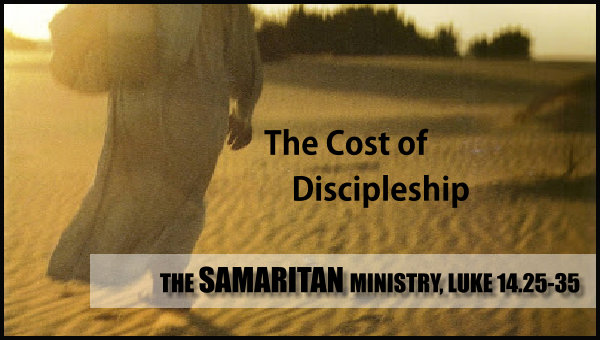By Tyson Thorne

The Samarian Ministry at Various Cities (9.51-18.34), 14.25-35
Last weekend I spoke to a woman, a therapist by profession, about Proposition 106, the “assisted suicide” bill before Colorado voters this November. She remarked that until we have experienced their pain and suffering we cannot say with certainty what we ourselves would do or if it is moral or immoral. I told her she was thinking about the issue the wrong way around. We determine the morality of an action before we are in the situation so that should such experiences occur we may stand firm in our conviction. In other words, we need to count the cost first.
We’ve come to a passage that is frequently preached and little practiced. This is a different setting from the Banquet Parables; Jesus is still on his final journey to Jerusalem where he knows he will die for the sins of the world. Perhaps this is what is on his mind, giving rise to the occasion for this teaching on The Cost of Discipleship. There are five costs one should consider before deciding to follow Jesus.
The first cost is one that has caused confusion among many, that we must hate our family. A literal hatred of our parents or siblings or spouses would of course be contradictory to the Law of God, so Jesus clearly intends us to understand his instruction in a less than literal fashion. Is he being figurative? I don’t think so. I think it’s all illustration of scale. Jesus has already affirmed the two greatest commandments, to love God and to love others as you love yourself. Our love for God is to be greater than our love for others, greater than our love for our own life in fact. If one were to chart the intensity of our love on a scale, our love for God would greatly outdistance our love for others and ourselves.
The second cost is the that of the Cross. Jesus had already used this illustration among the disciples once before (Luke 9.23) and here he uses is as a stark, albeit provocative, illustration. When a criminal was sentenced to death on a cross, Rome required the prisoner to carry the cross of his own crucifixion for a way through the city. This was a public spectacle that was intended as a form of confession. By carrying the cross, the criminal was confessing his guilt and agreeing that the death sentence was just. Likewise, any who take up the figurative cross of discipleship are agreeing with God about their sinful condition and need for his grace. It is a daily affirmation of our repentance and identification with the Messiah, a bit like Baptism, that would lead to rejection by others.
The third cost is that of Planning. Before building a tower one needs to assure they have the financing in place to complete the project. If one skips this step they may not be able to complete construction, leading to public shame and humiliation. Similarly, one who starts to follow Jesus and later follows another teaching is also open to public ridicule. In a culture like theirs, where an system of honor works very much like a cast system, this was the equivalent of losing one’s very reputation.
The fourth cost is that of Sacrifice. Before going to war a king will evaluate if he can obtain victory over a larger army. If unlikely, he will send a messenger to discuss the terms of a peace accord. Likewise, when we are confronted by God and the option of following him, we should do what is necessary to secure peace with him.
The fifth cost is that of Renunciation. There is nothing in this life, -- not family and friends, not pets, not houses or cars – that we would not be willing to let go of to follow God. Dietrich Bonhoeffer says it well:
“Earthly goods are given to be used, not to be collected. In the wilderness God gave Israel the manna every day, and they had no need to worry about food and drink. Indeed, if they kept any of the manna over until the next day, it went bad. In the same way, the disciple must receive his portion from God every day. If he stores it up as a permanent possession, he spoils not only the gift, but himself as well, for he sets his heart on accumulated wealth, and makes it a barrier between himself and God. Where our treasure is, there is our trust, our security, our consolation and our God. Hoarding is idolatry.”
At first, I was uncertain if the passage about “salt” was part of the context of discipleship. Looking at the Greek cleared up my dilemma, it clearly belongs. But what does salt have to do with discipleship? It is a warning against falling away. Those who accept the call to discipleship should never fall away, for like salt that has lost its character the disciple is cast away. The context is not 100 percent clear, but appears to indicate that this is not about losing salvation. Instead, it is a loss of fellowship and use.
Before committing ourselves to God and the service of his Kingdom, it is important to understand that there is no luxury of waiting for God to move us or of letting our circumstances dictate our actions. The commitment to love is high and will involve being rejected by others, careful planning of our convictions, sacrificing our own personal kingdom to the superior forces of God’s Kingdom, proclaiming all possessions as subservient to our love for God, and a commitment to complete the mission.
|
|